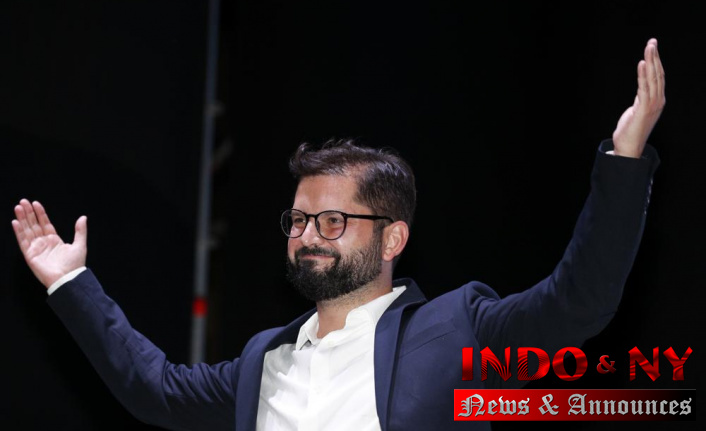Boric spent months in Chile, vowing to create a youth-led inclusive government to address nagging poverty. He also said that inequality and injustice were unacceptable consequences of the free market system that was established decades ago under the dictatorship of General Augusto Pinochet.
This bold promise was realized. Boric won with 56% of the votes and defeated Jose Antonio Kast (far right lawmaker), on Sunday. He was then elected Chile's youngest president at 35.
Boric climbed atop a barricade of metal to reach the stage, where he used Mapuche language to deliver a victory speech to thousands mostly young supporters.
Boric stated that "We are a generation who emerged in public life demanding that our rights be respected and not treated as consumer goods or businesses." "We are aware that there is justice for the wealthy and justice for those who are poor. We will not allow the poor to continue paying the price for Chile's inequalities."
The bespectacled, bearded President-elect highlighted his progressive positions in his speech. He also promised to stop climate change by blocking a proposed mine project in the largest copper producing country.
He also demanded the end of Chile's private pension system -- a hallmark of Pinochet's neoliberal economic paradigm.
This ambitious agenda is made more difficult by a gridlocked congress, ideological divisions that recall the ghosts of Chile's history that were brought to the forefront during the bruising campaign.
Boric was two percentage points ahead of Kast who has a history supporting Chile's military dictatorships. His attempt to paint his opponent as a puppet by his Communist Party allies, who would overthrow Latin America's most stable and advanced economy, failed in the head-tohead runoff.
Yet, Kast still conceded defeat in a model democratic civility that was free from the polarizing rhetoric of his campaign. He tweeted a picture of himself on the phone, congratulating his opponent for his "grand victory" and later went to Boric's campaign headquarters, to meet his rival.
Boric and Sebastian Pinera, the outgoing President, met via video to offer their full support for the three-month transition. This will be the second round of a runoff in Chile that saw 1.2 millions more people vote than the first round. It will also raise turnout to almost 56%, which is the highest level since 2012.
Cynthia Arnson, director of the Wilson Center's Latin America program, said that it was impossible not to be impressed with the historic turnout and Kast's willingness to concede and congratulate his opponent before the final results were in. "Chilean democracy won today," it is certain.
Young supporters of Boric waved flags with their names while jumping and shouting in Santiago's subway as they headed downtown to hear his victory speech.
Boris Soto, a teacher, said that "This is an historic day." "We have defeated fascism and the right wing but also fear."
Boric, Chile's youngest president, will take office in March. He will also be the second millennial leader in Latin America after Nayib Buukele in El Salvador. Only Giacomo Simoncini, the head of state of San Marino, in Europe, is older than Boric.
Latin America is likely to closely monitor the new government, as Chile has been a strong indicator of regional trends for many years.
It was the first Latin American country to end its Cold War dominance and embrace socialism, with the election in 1970 of Salvador Allende. The country's course was reversed a few years later, when Pinochet's coup brought an era of right-wing military rule. This allowed for a rapid experiment in free markets throughout the region.
Boric's goal would be to create a European-style social democratic that would allow for greater economic and political rights. This would help to combat nagging inequality, but not veer towards the authoritarianism that is embraced by much of the left in Latin America from Cuba to Venezuela. This task is made more urgent due to the coronavirus pandemic which has accelerated the reverse of a decade's economic gains.
Boric won by expanding his base beyond Santiago and appealing to rural voters. Boric won the Antofagasta region by nearly 20 points over Kast.
His victory was also helped by Chilean women who were a crucial voting bloc and feared that Kast's victory would reverse years of steady gains. Kast, 55, is a Roman Catholic devout father of nine and has a long history of attacking Chile's LGBTQ community as well as advocating for more restrictive abortion laws.
Boric promised in his victory speech that Chile's women would be "protagonists” in a government that seeks "to leave behind once and for all our patriarchal inheritance of society."












